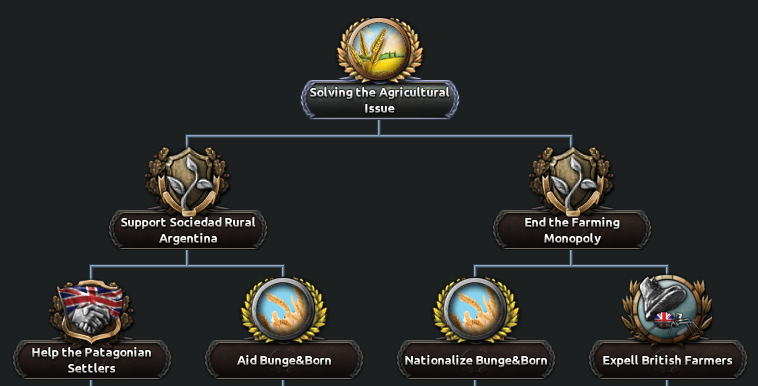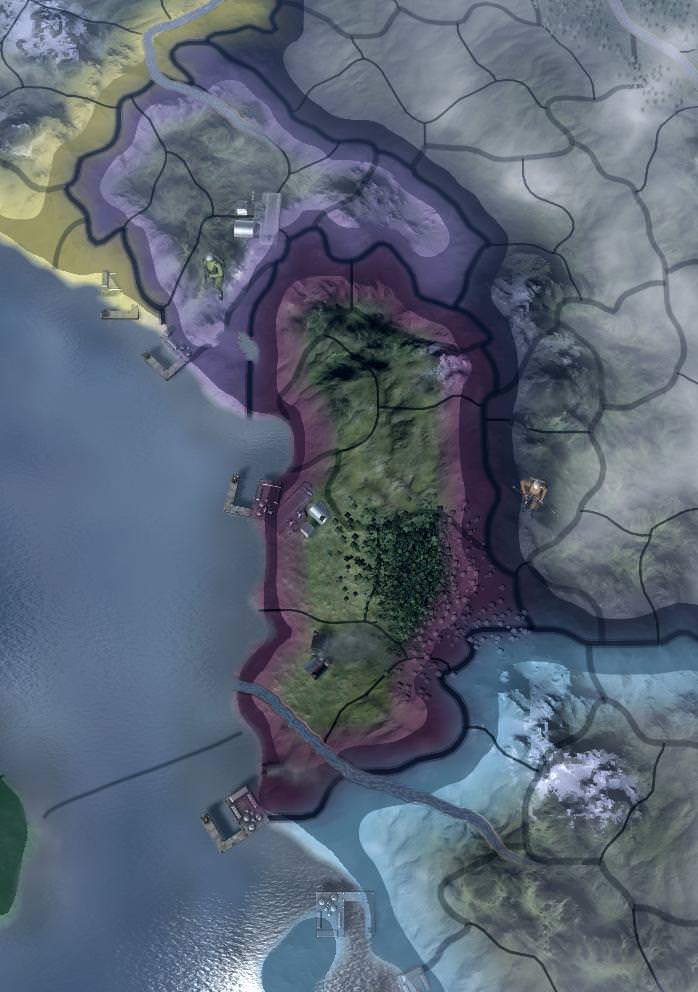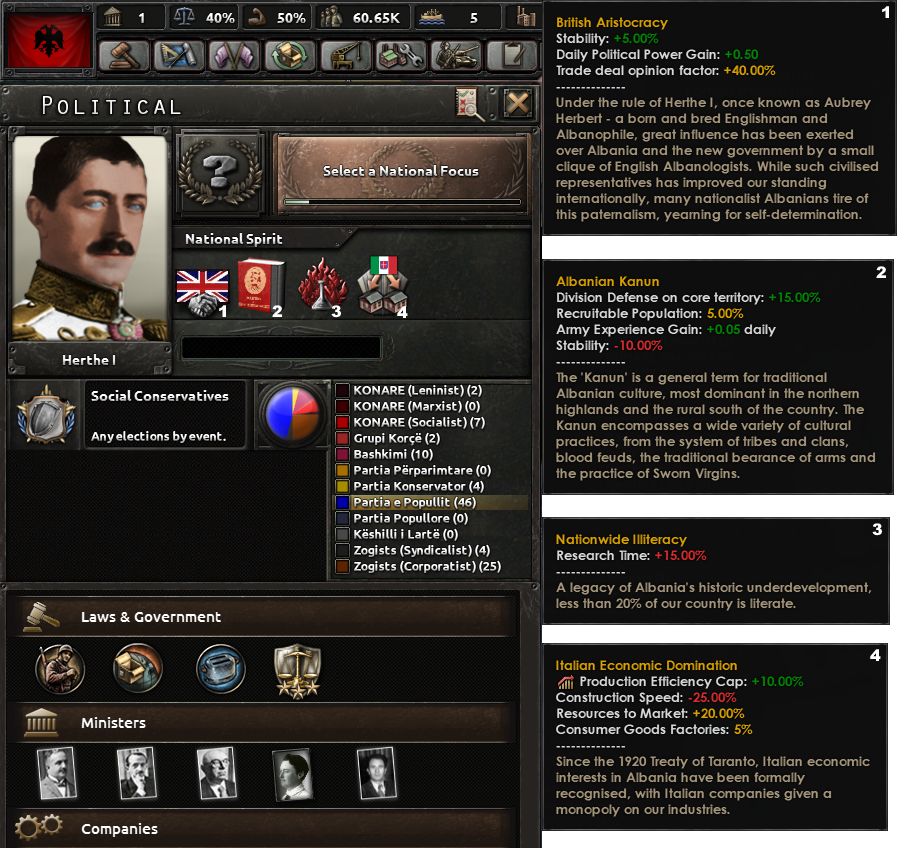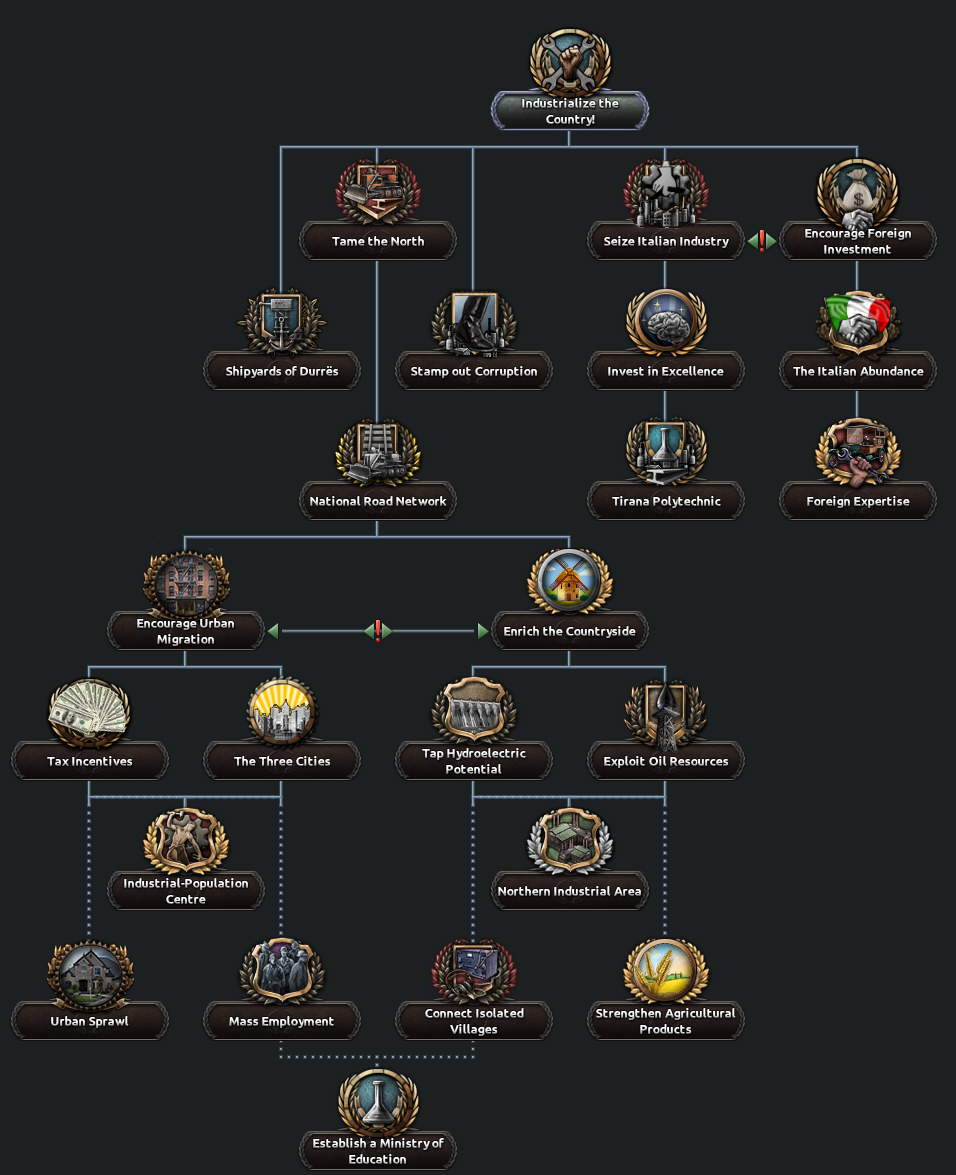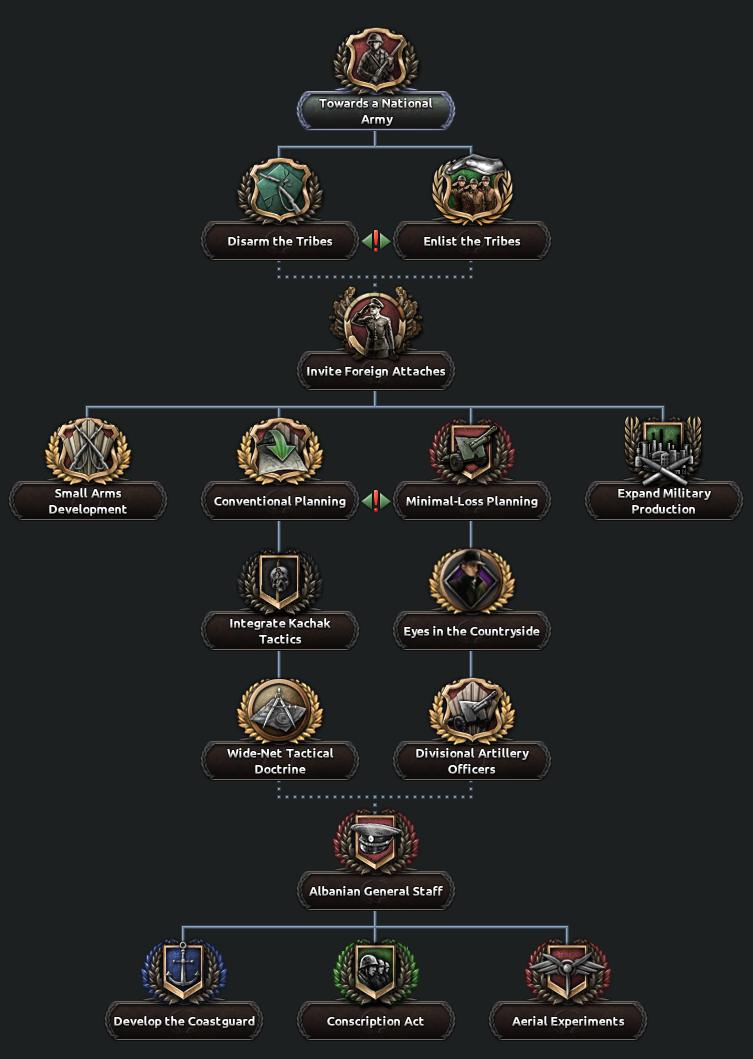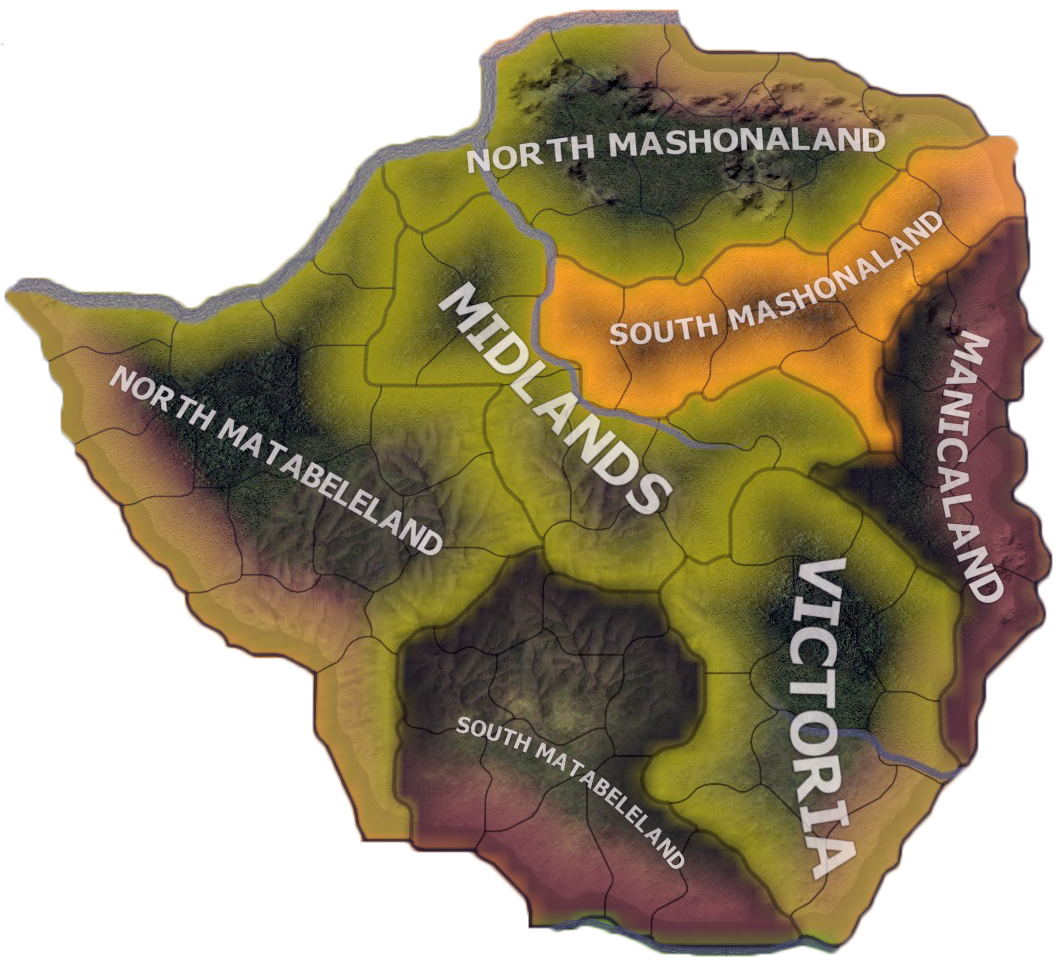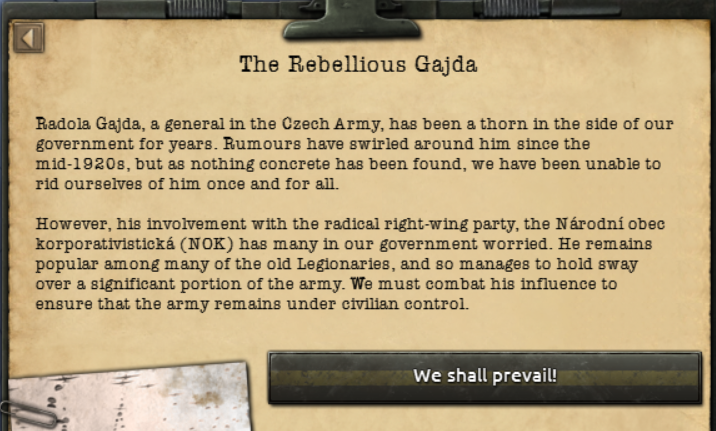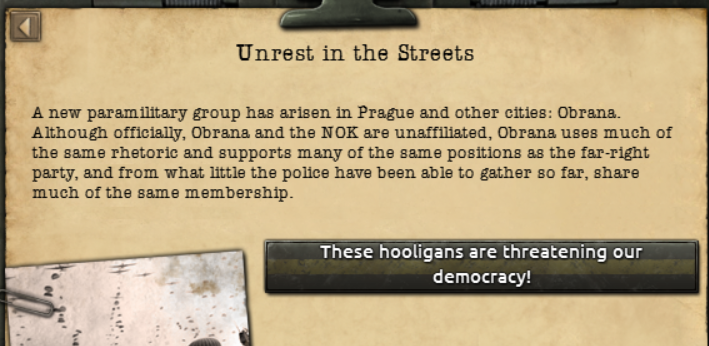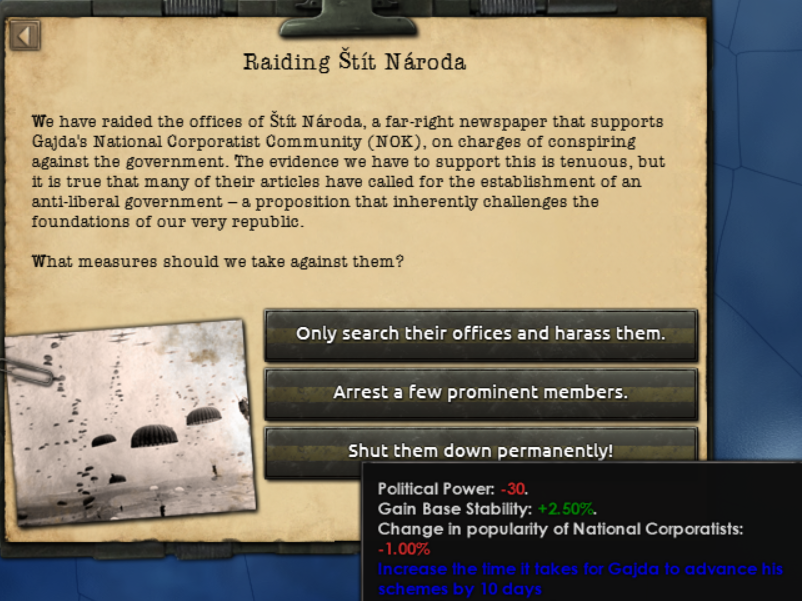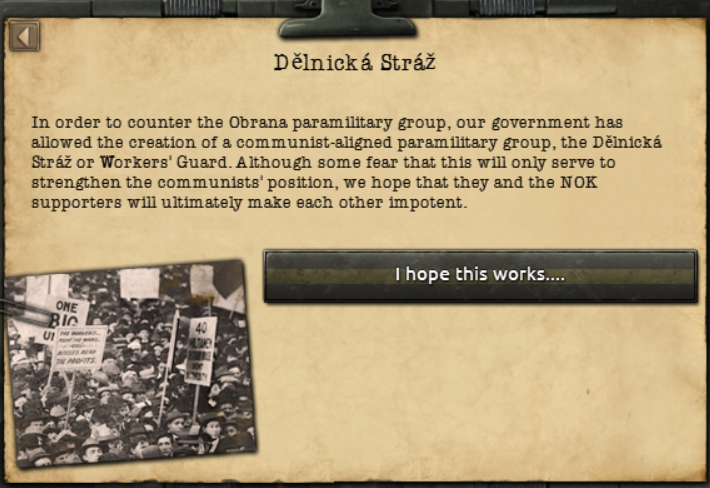Hello, and welcome to the thirteenth Dev Report for Spartakus. Here is the link to last weeks Dev Report.
KingPeng
Argentine Crisis
Hello There, it’s been a while since I post something in a Dev Diary. Anyways, let’s talk about crisis.
At the start of the game, Argentina would have to deal with two different economic crisis.
Firstly, there is the 1929 British Crash, also known as the Agrarian Crisis, due to it affecting Argentina’s biggest trade partner, and affecting the income created by Agricultural exports. To solve this, you must help the agrarian sector, either by giving monetary aid to the big exporters or by taking matters into your own hands.
The second crisis will come in 1932, as the United States falls to a great economic disaster. Since after WW1 Argentina had become reliant on US exports to sustain its agriculture and small industrial sector. You must impose emergency austerity policies which would not solve the crisis, but would help you ease the situation for the moment, and prepare an infrastructure plan to solve the issue of unemployment.
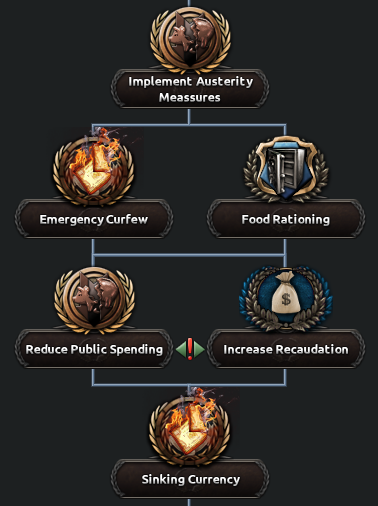
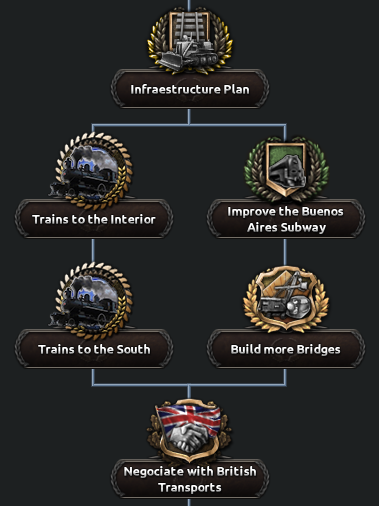
Resolving these 2 issues will allow you to continue through the economic path and fix the crisis.
Hiraeth
Introduction to Albania
Hello everyone! It’s been a while since I did a dev diary, and since the last progress report on Romania I have been doing a lot of work on Japan, into which a lot of effort is being put so that the content is as polished and well-done as it should be for a major country. You’ll see it eventually. However in the meantime taken a bit of a break to do some work on the other forgotten major of the 30s, Albania. Albania in Spartakus is seeing both some surprisingly interesting lore reworks, and also testing for some new gameplay aspects. I’ll be going over both of those here.
Albanian Lore:
Having been disjointed, divided and fought over since the collapse of the Ottoman Empire in Europe, Albania at last found some modicum of stability. Initially doomed to the status of an Italian protectorate after the Great War, Albanian militias attempting to seize the port city of Vlore in 1920 sparked a full war between Italy and Albania. The insecure government, still seeking a monarch after the flight of the short-lived Prince Vidi I, found their savior in the unlikely candidate of British MP and Aristocrat Aubrey Herbert. (In OTL, Herbert was in fact twice offered the throne of Albania, but declined. What if he’d accepted?) An orientalist and long-time champion for Albanian self-determination and one of the western diplomats who had first assured Albanian statehood in the 1913 Treaty of London, Herbert was hastily crowned as Herthe I of Albania. Successfully mediating with Italy he managed to conclude the Vlora War on terms favourable to Albania, while retaining amiability with Italy. Over the intervening decade, the unlikely British King has managed to establish a stable and developing Albanian state under the auspices of a small clique of fellow British Albanologists.
However, the regime faces threats from the King’s advanced age and increasing disability, as well as popular discontent in the form of nationalist intellectuals and army officers, lead by Ahmet Zogu. Influenced by ultranationalist thought developed in Italy and Romania, these young radicals desire to cast down what they see as a paternalistic foreign order and instate a true Albanian government, hoping to restore the ethnically Albanian territories lost to Greece, Serbia and Montenegro.

The threats on the left are less prominent in the largely unindustrialized country, however a politically diverse group of once-liberal exiles, KONARE, lead by the charismatic bishop Fan Noli have aligned themselves with the revolutionary ideologies of Germany & Russia, hoping to seize power when the Kingdom is weak.
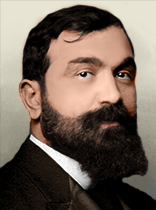
Albanian Gameplay:
The main part of the focus tree that most players will be pursuing immediately deals with Albania’s industrialization; offering a number of paths forward. Whether to shore up Italo-Albanian economic ties, or sever them to pursue national autarky. Later on, there is the question of how to approach the modernization of the country - centralise effort in the cities, encouraging migration, or to focus on the countryside and its resources?
The Great Depression does not affect Albania as hard first-hand given it’s largely rural, unindustrialized economy - however the effects wrought on Italy, given the country’s economically dependent relationship, will be very destabilizing.
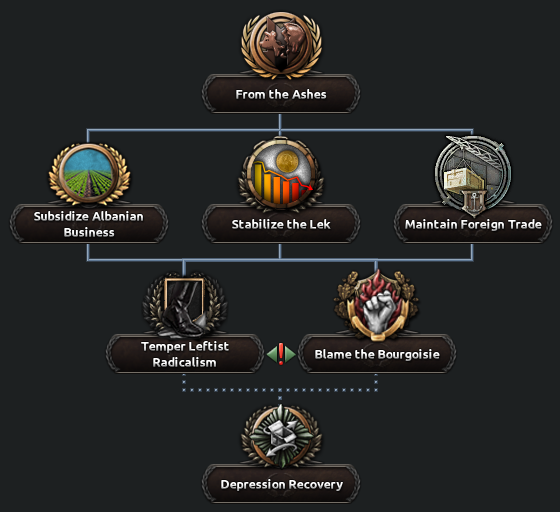
The question of Albania’s Army is also another pressing issue that must be dealt with. Any state exists through a monopolization on the use of violence, and a state as historically unstable as Albania will have to take extra precautions in order to preserve itself. Albania does however have a rich and varied landscape of tribes, most of them very well-armed, and the question of how to approach them in the military centralization of the country is one that could go either way.
Regional Tension
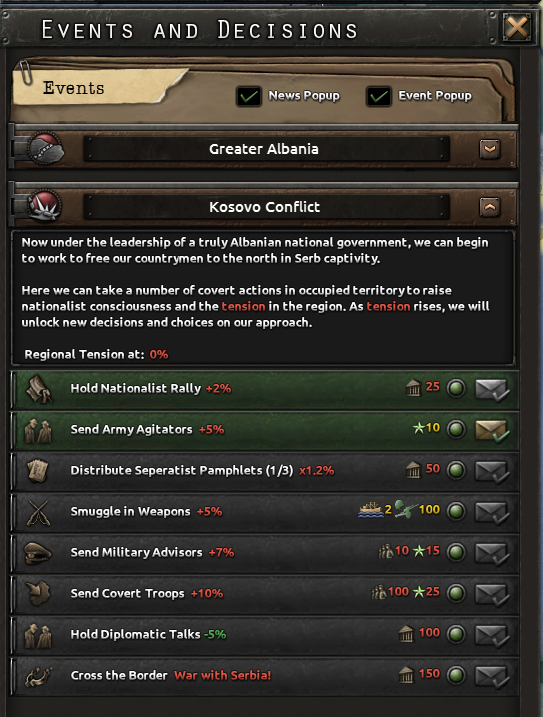
A mechanic being introduced by the Greater Albania segments of the political tree (which is remaining otherwise hidden for now, more on that later) is Regional Tension. Albania is a tiny, weak country with little in the way of military might, and yet with a great many territorial disputes, with three different countries. Thus, Albania (and potentially other countries’ in the future) will have a more covert way to achieve their aims than through outright warfare.
You’ll have options to spend various types of mana, political, army experience as well as manpower and equipment to further your goals in claimed regions. As tension rises, you’ll unlock more options until eventually the way is open to either force a conference with the territories’ occupiers on the future of the region (this may not go your way), or launch an invasion, during which you’ll get bonuses derived from your investment in militarizing the disputed areas such as rebels joining your army.
Addendum
I’m leaving out the Political Tree for this dev diary since it isn’t quite finished yet, but I’ll leave you with a teaser.
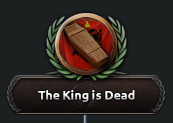
sparkz
Making Africa Fun - (Southern) Rhodesia
After rapid fire developing South Africa, I quickly finished up to Southern Rhodesia to complete the Caucaususization of most of lower Southern Africa.
Southern Rhodesia is part of the Central African Federation, also officially known as the Federation of Rhodesia and Nyasaland. Historically, this was established near the end of colonization during the 1950s and 1960s, however the issues that resulted in decolonization come much earlier in the Spartakus timeline due to a number of factors including but not limited to the Statute of Westminster failing, Comintern meddling within the colonies and increasingly dire economic situations throughout the colonies.
In an attempt to alleviate these troubles, the British reorganized many of the colonies in Southeastern Africa in the 1920’s by federating Kenya, Uganda, Zanzibar and the newly acquired Tanganyika/Tanzania into the East African Federation, and likewise the self-governing colony of Southern Rhodesia/Zimbabwe was federated with Northern Rhodesia/Zambia and Nyasaland/Malawi as the Central African Federation. Only Bechuanaland/Botswana was spared, but much its administration is done from neighboring South Africa.
I hope you enjoyed this mini lore dump. Britain will have multiple in game ways of influencing, developing and ultimately exploiting these colonies with the potential of various revolts.
NatSpi
The Czech Republic
Last time we visited the isolated Czech Republic, I alluded to a few potentially destabilising events that may occur during the course of the game. First, let me show you Czechia’s political situation, as well as a few of their starting national spirits. As you can see, no one party has a large amount of popularity, and as such none of them has anything nearing a majority in the parliament. This is why five of the most prominent parties decided to form the Pětka, or Committee of Five.
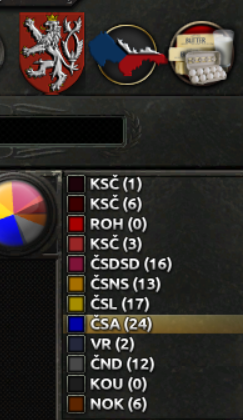
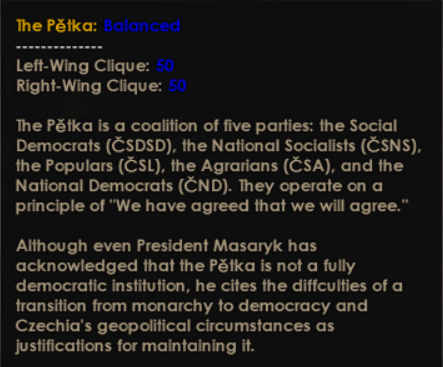
To better represent the Pětka, and coalition governments in general, I’ve modified the popularity system (in which higher ruling party popularity gives a higher rate of political power gain), to allow for the system to take coalitions into account. This means that the popularity system takes into account the popularity of all five coalition parties; therefore, since the Pětka has a combined popularity of 82% at the start of the game, they begin with high popularity. Other countries are also adopting this system.
Moving on: Meet the rebellious general Radola Gajda. The OTL Gajda Affair of the mid- to late-1920s never occurred in the world of Spartakus, due to a number of factors such as the Polish May Coup never occurring (since Poland is a socialist republic).
In Spartakus, therefore, Gajda retains a large degree of influence within the military, especially among those who served with the Czechoslovak Legion during the Russian Civil War. If Gajda and the party he supports, the fascist NOK, are permitted to effect their schemes without sufficient resistance from the civilian government, Czech democracy may be at risk.
The government may choose to resort to riskier and riskier methods, but be careful, or you may be facing even larger crises…..

That’s all from me today! Pravda vítězí!
We hope you enjoyed the thirteenth Dev Report! Remember to join the Discord as well, as many additional teasers are posted on there daily. Discord.gg
